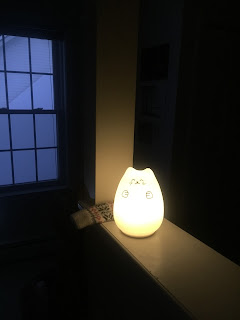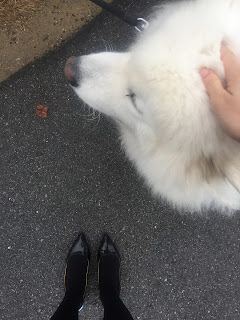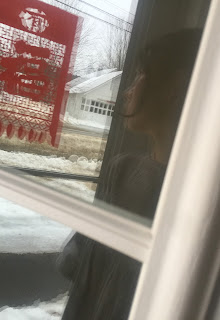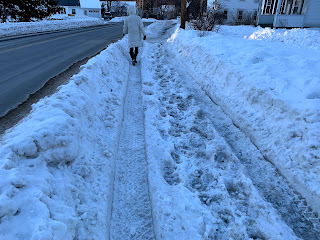Some choice passages from
The Magic Mountain, by Thomas Mann.
Seasons
Behold “a wide, luxuriantly green park of hardwoods, of elms, planes, beeches, maples, birches, with subtle gradations in the colors of the full, fresh, glossy foliage. Their tops rustled gently in the breeze, and the air was perfumed with their delicate, moist balm... A rainbow stretched across flank of the landscape... shimmering in pure splendor and flowing like rich oils down into the dense, lustrous green” (480-481). Rattlesnake Mountain, Oct 2018.
“The sun abruptly hid itself... and a wind bearing cold, alien air that went to your bones and seemed to have come from unknown regions of ice suddenly swept down through the valley, setting the temperature plunging and inaugurating a whole new regimen” (92). The wind bowl, Feb 2019.
We could tell that “spring had definitely arrived, a spring without any hint of summer’s oppressiveness—with spicy, light, thin air, with a radiant, silvery-blue sky and blossoming meadows as colorful as a child’s paint box” (364). Middlebury Organic Farm, May 2018. Photo by Yuki.
Waiting for “great masses of Alpine campion and wild pansies, daisies, marguerites, cowslips in red and yellow—much larger and more beautiful than any Hans Castorp remembered seeing in the flatlands, that is, to the extent that he had ever paid any attention to them—plus nodding soldanella, little ciliated bells of blue, purple, and pink, a specialty of the region” (365). Garden-peeping in Meredith, Aug 2018.
Boredom

“What is the cause of the enervation and apathy that arise when the rules of life are not abrogated from time to time? It is not so much the physical and mental exhaustion and abrasion that come with the challenges of life (for these, in fact, simple rest would be the best medicine); the cause is, rather, something psychological, our very sense of time itself—which, if it flows with uninterrupted regularity, threatens to elude us... Emptiness and monotony may stretch a moment or even an hour and make it 'boring,' but they can likewise abbreviate and dissolve large, indeed the largest units of time, until they seem nothing at all. Conversely, rich and interesting events are capable of filling time, until hours, even days, are shortened and speed past on wings; whereas on a larger scale, interest lends the passage of time breadth, solidity, and weight, so that years rich in events pass much more slowly than do paltry, bare, featherweight years that are blown before the wind and are gone" (102). Winter storm, Feb 2019.
Variety is the spice of life: "What people call boredom is actually an abnormal compression of time caused by monotony... When one day is like every other, then all days are like one, and perfect homogeneity would make the longest life seem very short, as if it had flown by in a twinkling. Habit arises when our sense of time falls asleep, or at least, grows dull; and if the years of youth are experienced slowly, while the later years of life hurtle past at an every-increasing speed, it must be habit that causes it. We know full well that the insertion of new habits or the changing of old ones is the only way to preserve life, to renew our sense of time, to rejuvenate, intensify, and retard our experience of time—and thereby renew our sense of time itself" (102). Nobody likes you when you're 23, Jan 2019.

Coming and going: "[This] is the reason for every change of scenery and air, for a trip to the shore: the experience of a variety of refreshing episodes. The first few days in a new place have a youthful swing to them, a kind of sturdy, long stride—that lasts for about six to eight days. Then, to the extent that we 'settle in,' the gradual shortening becomes noticeable. Whoever clings to life, or better, wants to cling to life, may realize to his horror that the days have begun to grow light again and are scurrying past... To be sure, this refreshment of our sense of time extends beyond the interlude; its effect is noticeable again when we return to our daily routine. The first few days at home after a change of scene are likewise experienced in a new, broad, more youthful fashion—but only a very few, for we are quicker to grow accustomed to the old rules than to their abrogation. And if our sense of time has grown weary with age or was never all that strongly developed—a sign of inborn lack of vitality [is this me]—it very soon falls asleep again, and within twenty-four hours it is as if we were never gone and our journey was merely last night’s dream” (103). Routine, Jan 2019.
Spacetime: t, x, y, z

The classroom where we ask: “What is time? A secret—insubstantial and omnipotent. A prerequisite of the external world, a motion intermingled and fused with bodies existing and moving in space. But would there be no time, if there were no motion? No motion, if there were no time? What a question! Is time a function of space? Or vice versa? Or are the two identical? An even bigger question! Time is active, by nature it is much like a verb, it both 'ripens' and 'brings forth.' And what does it bring forth? Change! Now is not then, here is not there—for in both cases motion lies in between. But since we measure time by a circular motion closed in on itself, we could just as easily say that its motion and change are rest and stagnation—for the then is constantly repeated in the now, the there in the here. Moreover, since, despite our best desperate attempts, we cannot imagine an end to time or a finite border around space, we have decided to 'think' of them as eternal and infinite—in the apparent belief that even if we are not totally successful, this marks some improvement. But does not the very positing of eternity and infinity imply the logical, mathematical negation of things limited and finite, their relative reduction to zero? Is a sequence of events possible in eternity, a juxtaposition of objects in infinity? How does our makeshift assumption of eternity and infinity square with concepts like distance, motion, change, or even the very existence of a finite body in space? Now there’s a real question for you!” (339). Sep 2018.
“We walk and we walk—how long has it been now? How far? It does not matter. And at every step, nothing changes—‘there’ is now ‘here,’ ‘before’ is both ‘now’ and ‘then.’ Time drowns in the unmeasured monotony of space. Where uniformity reigns, movement from point to point is no longer movement; and where movement is no longer movement, there is no time” (537). The commute, Jan 2019. Photo by Nicole.

Topic 9.3, resolving two distant stars: “It was a faith like any other, only worse and more obtuse than the rest... The ether of space—that was exact, was it? The atom, that nice little mathematical joke, ‘the smallest, indivisible particle’—proved, was it? The theory of infinite space and time—that was definitely based on experience, was it? Indeed, with just a modicum of logic, one could achieve very amusing results from the dogma of infinite space and time—to wit, nothing. To wit, the insight that realism was true nihilism. And why? For the simple reason that in relation to infinity any given unit of mass approached zero. There was no size in infinity, and no duration or change in eternity, either. In infinite space, given that every distance is the mathematical equivalent of zero, there could be no two adjacent points, let alone a body, let alone movement…What blasphemous nonsense, ultimately, to measure the ‘distance’ of some star or other from the earth in trillions of miles or even light-years and to imagine that by the ruse of number you had given the human spirit an insight into the nature of infinity and eternity—when infinity had absolutely nothing to do with size, nor eternity with duration and distances in time… Indeed, the child’s simple belief that stars were holes in the tent of heaven through which eternal brightness shone was many thousand times dearer to his heart than all the empty, absurd, and presumptuous babble about the ‘cosmos’ perpetuated by monistic science” (681-683). Christmas tea lights, Dec 2018.

“Space, as it rolls and tumbles away between him and his native soil, proves to have powers normally ascribed only to time; from hour to hour, space brings about changes very like those time produces, yet surpassing them in certain ways. Space, like time, gives birth to forgetfulness, but does so by removing an individual from all relationships and placing him in a free and pristine state—indeed, in but a moment it can turn a pedant and philistine into something vagabond. Time, they say, is water from the river Lethe, but alien air is a similar drink; and if its effects are less profound, it works all the more quickly” (4). CNY in NH, Feb 2019.
Music {and, vs., in} written word

Debatable: “Yes, I am a fancier of music—which is not to say that I particularly revere it—not, for instance, as I love and revere the written word, the bearer of the human intellect, the tool, the shining plow of progress. Music…there is something only semi-articulate about it, something dubious, irresponsible, indifferent... Let music assume its most high-minded pose. Fine! And then our emotions are inflamed. And yet the real point would be to inflame our reason. Music, it would appear, is movement for its own sake—although I suspect it of quietism... Music is invaluable as the ultimate means for awakening our zeal, a power that draws the mind trained for its effects forward and upward. But literature must precede it. By itself, music cannot draw the world forward. By itself, music is dangerous” (111). Tomi Jazz waiting room, Feb 2019. Photo by Diana.
“Word was the glory of humankind, and it alone gave dignity to life. Not just humanism, but humanity itself, man’s dignity and self-respect—they were inseparable from the Word, from literature... And politics were bound up with literature, too—or rather they were derived from the oneness of humanity and literature. For the beautiful Word gave birth to the beautiful deed” (158). 4pm walk, Feb 2019.
“Music a story is like music in that it fills time, 'fills it up so nicely and properly,' 'divides it up,' so that there is 'something to it,' 'something going on'…Time is the element of narration, just as it is the element of life—it is inextricably bound up in it, as bodies are in space. It is also the element of music, which itself measures and divides time, making it suddenly diverting and precious; and related to music, as we have noted, is the story, which also can only present itself in successive events, as movement toward an end (and not as something suddenly, brilliantly present, like a work of visual art, which is pure body bound to time), and even if it would try to be totally here in each moment, would still need time for its presentation." Stories with the Giant Peach, Mar 2019.
t and
t-prime: "The time element of music is singular: a segment of human earthly existence in which it gushes forth, thereby ineffably enhancing and ennobling life. Narrative, however, has two kinds of time: first, its own real time, which like musical time defines its movement and presentation; and second, the time of its contents, which has a perspective quality that can vary widely, from a story in which the narrative’s imaginary time is almost, or indeed totally coincident with its musical time, to one in which it stretches out over light-years. A musical piece entitled 'Five Minute Waltz' lasts five minutes—this and only this defines its relationship to time. A story whose contents involved a time span of five minutes, however, could, by means of an extraordinary scrupulosity in filling up those five minutes, last a thousand times as long—and still remain short on boredom, although in relationship to its imaginary time it would be very long in the telling. On the other hand, it is possible for a narrative’s content-time to exceed its own duration immeasurably." Old Country Store, Moultonborough, Mar 2019.
Love, and not reason, yields kind thoughts
“Man is the master of contradictions, they occur through him, and so he is more noble than they. More noble than death, too noble for it—that is the devotion of his heart... Love stands opposed to death—it alone, and not reason, is stronger than death. Only love, and not reason, yields kind thoughts... I will keep faith with death in my heart, but I will clearly remember that if faithfulness to death and to what is past rules our thoughts and deeds, that leads only to wickedness, dark lust, and hatred of humankind. For the sake of goodness and love, man shall grant death no dominion over his thoughts” (487). Cheery dining hall day, Feb 2019.
As Hans fights in WWI: “Farewell, Hans—whether you live or stay where you are! You chances are not good. The wicked dance in which you are caught up will last many a little sinful year yet, and we would not wager much that you will come out whole. To be honest, we are not really bothered by leaving the question open. Adventures in the flesh and spirit, which enhanced and heightened your ordinariness, allowed you to survive in the spirit what you probably will not survive in the flesh. There were moments when, as you 'played king,' you saw the intimation of a dream of love rising up out of death and this carnal body. And out of this worldwide festival of death, this ugly rutting fever that inflames the rainy evening sky all around—will love someday rise up out of this, too?” (706). Looking ahead at Land's End Labyrinth, Aug 2018.
Bits and bats
According to my AP Physics teacher, Mr. Davis, one should only ever invest in “education and property—behold the bourgeoisie!” (504). Another kind of reading:
https://davidbach.com/books/.
Smart Women Finish Rich tells all about pretax retirement account.
The attitude I should have had in discussion classes: “I’m talking nonsense, I know, but I would rather babble away and at least partially express something difficult than reproduce impeccable cliches” (576).
Silicon Valley fashion: “There he sat, sporting a little beard that he had let grow out by then…which we are forced to interpret as a sign of a certain philosophical indifference to his appearance” (688).
中庸之道: “Humanist—certainly I am that. You will never find me guilty of ascetic tendencies. I affirm, I respect, I love the body, just as I affirm, respect, and love form, beauty, freedom, mirth, and pleasure—just as I champion the ‘world,’ the interests of life against sentimental flight from the world,
classicismo against
romanticismo” (245).
The essential little intervention: “He saw that the enchantment was broken, that he was released, set free—not by his own actions, as he had to admit to his shame, but set free by elementary external forces, for whom his liberation was a very irrelevant matter” (702).
Youtubers: “To be human was to be ill... and whoever sought to make him healthy and attempted to get him to make peace with nature, to “return to nature” (whereas he had never been natural), the whole pack of Rousseauian prophets—regenerators, vegetarians, fresh-air freaks, sunbath apostles, ad so forth—wanted nothing more than to dehumanize man and turn him into an animal. Humanity? Nobility? The Spirit was what distinguished man—a creature set very much apart from nature, with feelings very much contrary to nature—from the rest of organic life. Therefore, the dignity and nobility of man was based in the Spirit, in illness. In a word, the more ill a man was the more highly human he was, and the genius of illness was more human than that of health” (457). I still like Youtubers.

















No comments:
Post a Comment